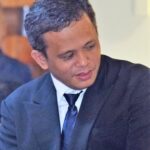
Christopher Maboloc
President Rodrigo Duterte will have a critical role in the forthcoming midterm elections. After all, he is the leader that most governors and mayors in the country continue to look up to. He remains to be the man – the voice of marginalized narratives that society needed to hear. In the mind of his critics, President Duterte was a disruptor. They say that his politics is a type of populism that only undermined the democratic institutions in the country. But history never lies. President Duterte is the revolution from below that challenged the elites and the dominant power structures in the country.
As a matter of fact, the former President was instrumental in giving the Bangsamoro the chance to achieve lasting peace after years of war. Symel De Guzman Daulat explains: “Suffering from centuries of institutional neglect and oppression, the people of Mindanao sought to fight back against a system which relegated their struggle as unsightly and barbaric. The result of this revolt, Duterte—a seemingly simple everyman—dignified an anti-elite conduct which celebrates his vulgarity and pokes fun at formalities.”
Political forces are at work right now. These politicians, both young and traditional, are beginning to show their skin. They are already positioning themselves. This is happening while a crack in the marriage between the House of Marcos and the House of Duterte is manifesting. It is not an impending collapse of a coalition, at least for now. But while there is no apparent power struggle at the top as of the moment, some leaders in the House of Representatives are behaving in ways that is expected of them. Frankly speaking, Congress has an image problem.
Truth be told, the Presidency is a matter of destiny. All historical elements must be present. Past elections show this. Joseph Estrada was impeached and deposed from Malacañang. This opened the door for Gloria Macapagal Arroyo. In the run up to the 2010 Presidential Elections, the death of former President Corazon Aquino, a democratic icon, ushered a sense of nostalgia. This catapulted her son Benigno Aquino III to the presidency. There are others who possess greater competence and integrity, but power has its own ways of deciding the future and hope of a people. The writing is on the wall.
The current House Speaker carries a moral burden. The man belongs to the elite. While VP Sara Duterte may not be as vocal as her father, she doesn’t carry the same baggage that Martin Romualdez has. President Bongbong Marcos does not have to choose between the two, at least not yet. The Dutertes simply have to protect and maintain their turf. It is for this reason that the midterm election is crucial in the present political dynamics of the country. All politics is local, they say. But the popularity of a candidate is not enough. The political machinery of any party at the grassroots level is important in achieving results come election day.
Even if people insist that we should not be talking politics this early and instead focus on pressing issues, say inflation and the West Philippine Sea, there’s no way of avoiding such because the political is part of the soul of this nation. Our democracy is a contested terrain. This is the nature of the power dynamics in Philippine society in which there exists a deep moral divide between rich and poor, creating a wedge that deepens further the pain of that divide.
When it comes to Philippine society, in times past and now, the plot is certainly the most basic. It is and will always be about the struggle for power. Some become pawns in that struggle. In the past it was ABS-CBN, now that role belongs to SMNI. The only permanent thing in the political is conflict. This is because power is not a question of who has it. Power never stays in the same position for a long time. It’s always a question of who wants it more and how one puts himself in a position to determine its very possibilities. He who controls it will define what is to become of the destiny of every human soul. (Christopher Maboloc)


